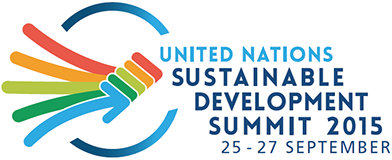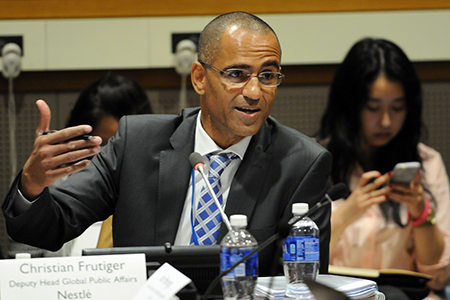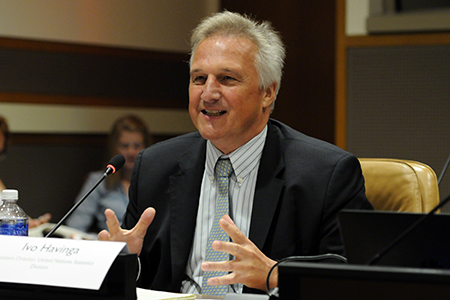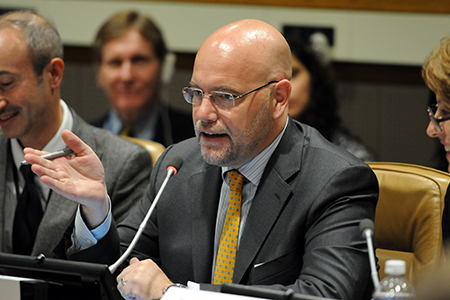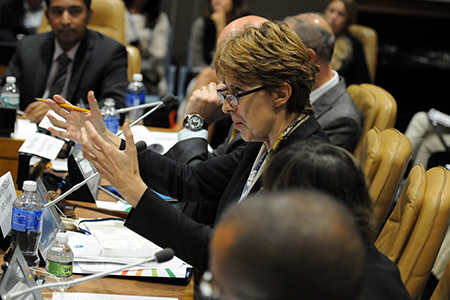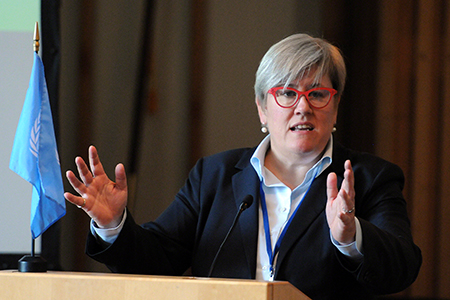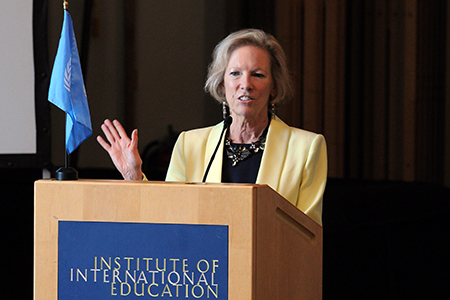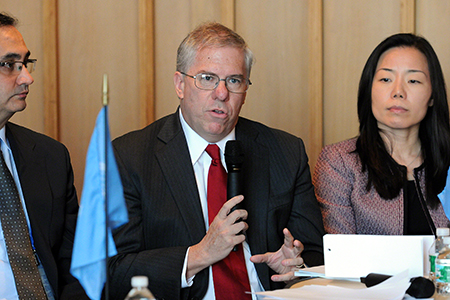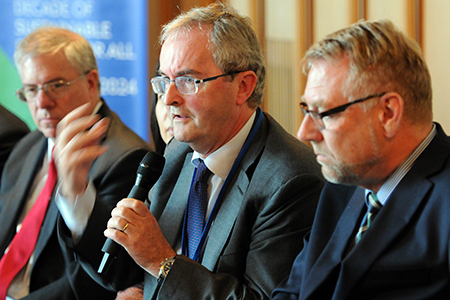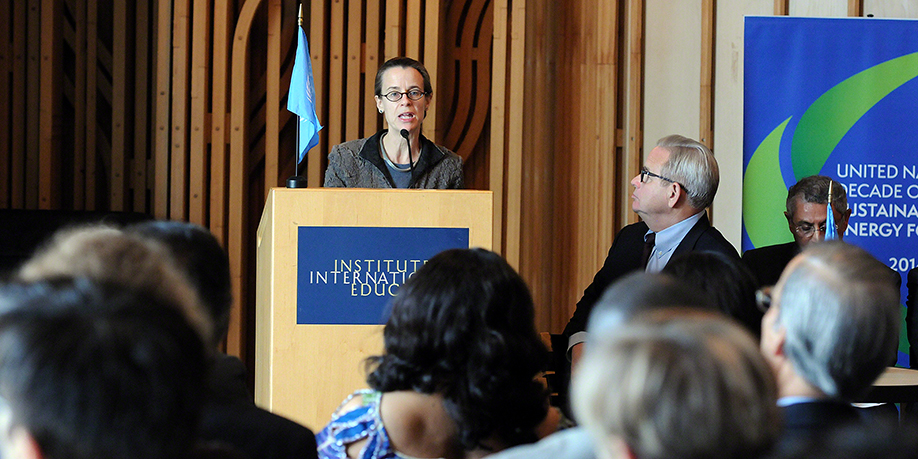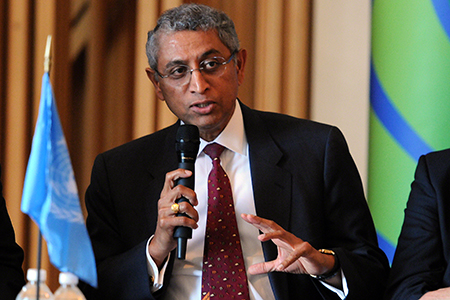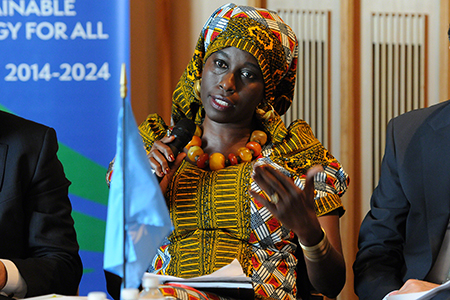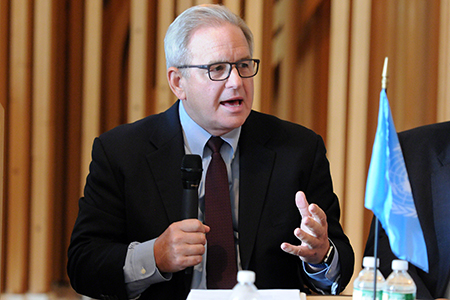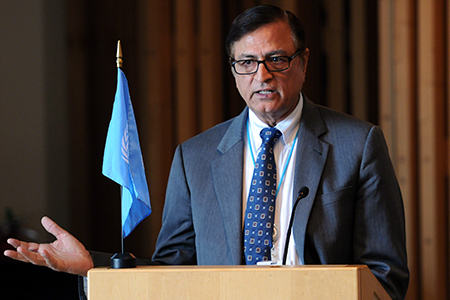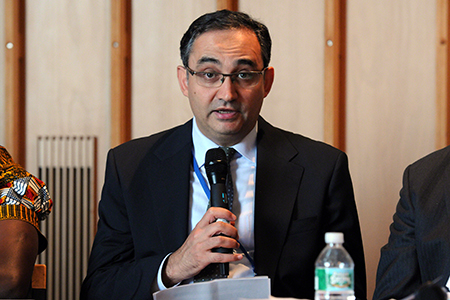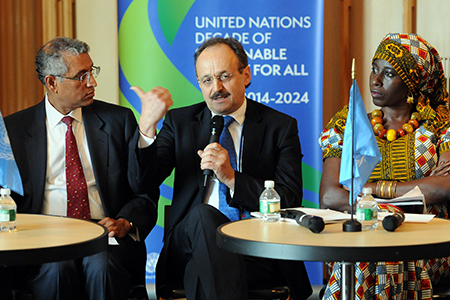Coverage of Selected Side Events for Friday, 25 September 2015 at the United Nations Sustainable Development Summit 2015
25 September 2015 | UN Headquarters, New York
Receive ENBOTS Meeting Reports |
||
|
Receive our ENBOTS bulletins and reports by email: |
||

| Follow @IISDRS | ||

Loading... |
||
|
Receive emailed updates with the news articles above plus related information and announcements from our SDG community mailing list: |
||
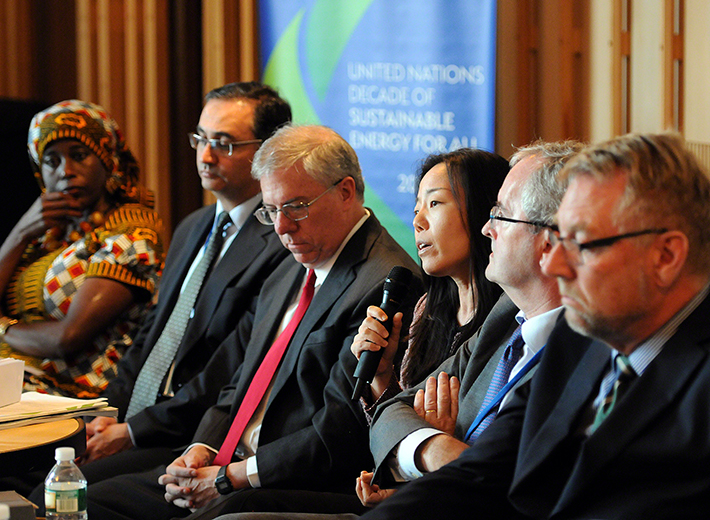
Panelists during the side event on Implementing Sustainable |
||
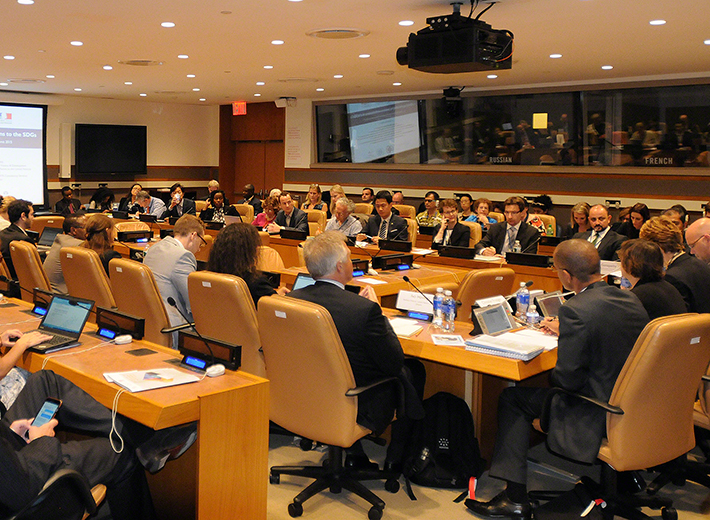
Audience during the side event on Enabling and Tracking Business Contribution to the SDGs. |
||
|
The following side events were covered by ENBOTS on Friday, 25 September 2015. |
||
|
IISD Reporting Services, through its Earth Negotiations Bulletin on the Side (ENBOTS), will provide daily web coverage and summaries of selected side events from the United Nations Sustainable Development Summit 2015. | ||
Enabling and Tracking Business Contribution to the SDGs
Presented by the Global Reporting Initiative (GRI) and the French Government |
||
| ||||
|
|
|
The side event ‘Enabling and tracking business contributions to the SDGs’ focused on ways to inspire and monitor private sector contributions to the Sustainable Development Goals (SDGs). Representatives from the UN, governments, the business community and civil society discussed initiatives that promote responsible business conduct, as well as ways to use business data to support the SDGs’ follow-up and review process. Michael Meehan, Chief Executive, Global Reporting Initiative (GRI), stressed the need to inspire business to act as an agent of change in implementing the SDGs. He presented two innovative tools designed to facilitate business action on the SDGs: the SDG Compass, a guide for business action to advance the SDGs, and SDG Target 12.6 Live Tracker, which provides information that governments and other corporate stakeholders can use to understand how the uptake of sustainability reporting is progressing around the world. Ambassador Lisa Kubiske, US Deputy Assistant Secretary of State for International Finance & Development, underscored the importance of the private sector’s involvement in SDGs’ implementation, especially through creating jobs that are “the lifeblood of economy.” She also spoke about the US National Action Plan on Responsible Business Conduct. François Gave, Head of Development and Sustainable Development Department, French Mission to the UN, discussed the importance of developing national policies that promote business transparency and accountability, as well as the sustainability reporting laws. He stressed that hard law is key to SDG implementation as it is essential for creating a stable framework and a level playing field for business. Ivo Havinga, Assistant Director, UN Statistics Division (UNSD), stressed the need to look at both financial and non-financial data matrices when discussing the private sector’s involvement in implementing the SDGs. He called for aligning the non-financial matrix with the standards of environmental accounting. He also noted the need for cooperation with the private sector in finding ways to measure difficult issues such as human rights or peace and security, as well as in measuring the gender aspects of the 2030 Agenda for Sustainable Development. Balaji Ganapathy, Head of Workforce Effectiveness/ Corporate Social Responsibility, TATA Consultancy Services (TCS), discussed TCS’s work in partnership with organizations and governments to address development issues through its philanthropic engagements, business practices and creative projects. He emphasized the importance of a robust triple bottom line – people, planet and profit – and identified four essential elements of TCS’s success: thought leadership; new technologies; private-public partnership; and funding. Christian Frutiger, Deputy Head Global Public Affairs, Nestlé, said the company is supporting the transition to sustainable consumption and production (SCP) patterns through education, and discussed ways changing production patterns can help reduce water consumption in irrigation by 60% and protect the soil, while doubling production. He called for UN Member States and stakeholders to agree on a single monitoring mechanism of SDG implementation and focus on making it work as effectively as possible. In the discussion that followed, civil society representatives highlighted inter alia: the role of the SDGs in aligning the work of governments, the private sector and civil society; the importance of transparency and accountability in implementing the SDGs; the need for a solid ethical framework to encompass the strengthened role of the private sector; and the importance of keeping in focus the needs of the poorest and most vulnerable. |
| ||||
|
||||
Implementing Sustainable Development Goal 7: Financing Sustainable Energy for All Presented by the Sustainable Energy for All (SE4All) Initiative |
||
|
|
|
|
| ||||
|
|
|
The high-level side event ‘Implementing Sustainable Development Goal (SDG) 7: Financing Sustainable Energy for All (SE4All)’ focused on the challenges and opportunities in financing the implementation of SDG 7 on ensuring access to affordable, reliable, sustainable and modern energy for all. Opening the event, Jonah Kokodyniak, Deputy Vice President, Strategic Development, Institute of International Education, emphasized how work in educational exchange is a key part of achieving goals on energy sustainability. Kathy Calvin, President and Chief Executive Officer, UN Foundation, reflected on the “historic” adoption of the new development agenda, noting that the SE4All initiative is a cutting edge model for progress over the next 15 years. Rachel Kyte, Special Representative of the Secretary-General for SE4All and CEO designate, encouraged focus on implementation, underscoring that solutions must be found for the energy dilemma, especially given the importance of energy to achieving many of the SDGs. She highlighted that the need for tripling annual investments to close energy gaps will require new commitments by all stakeholders. Setting the scene, Vivien Foster, Lead Economist, the World Bank, answered the question of whether the world was accelerating fast enough to escape the gravitational pull of energy poverty. She based her discussion on the results of the Global Tracking Framework (GTF) report, concluding that despite acceleration, “we are not moving fast enough to end energy poverty by 2030.” Mohinder Gulati, Chief Operating Officer, SE4All, further introduced the GTF report, which provides an update on how fast the world moved toward sustainable energy goals between 2010 and 2012, and serves as a framework for stimulating partner dialogue and the design of new financial instruments. Eight panelists from a range of private, public and non-governmental organizations, moderated by Chad Holliday, Chair of the Board, Royal Dutch Shell, then discussed next steps and how to take the results of the GTF report forward. Purna Saggurti, Chairman, Global Corporate & Investment Banking, Bank of America Merrill Lynch, noted the dual problems of improving energy efficiency in the developed world and energy access in the developing world. He highlighted the importance of providing investors with a supply of projects as well as the large impacts that smaller investments can have. Klaus Rudischhauser, Deputy Director General, Directorate-General for Development Cooperation, European Commission, discussed the importance of de-risking investments and helping countries with reform in order to improve the availability of bankable projects. He stressed the need to leave fossil fuels in the ground and to put substantial finance into renewables. Sheila Oparaocha, International Coordinator, ENERGIA, relayed the urgency of bringing women into the energy access agenda. She underscored the need for targets for funding gender and women’s initiatives as well as tracking progress with regard to cooking. She also called for gender disaggregated data in tracking progress toward SDG 7. Savas Alpay, Chief Economist, Islamic Development Bank Group, submitted a statement that emphasized the impacts of public-private partnerships and underscored the Bank’s support of collaboration on sustainable, affordable energy. Eric Postel, Associate Administrator, Power Africa, USAID, relayed the US Government’s commitment to SDG 7, highlighting the launch of Power Africa and the Government’s engagement on the issue of cook stoves. Kyung-Ah Park, Head of the Environmental Markets Group, Goldman Sachs, discussed the difficulties of getting significant capital to flow to developing countries where there is risk, as well as the need to create an enabling environment in these countries. She noted that capital intensive investments can take years to pay back, and that investors need to see long-term stability. With regard to universal access, she stressed the difficulties in financing small scale investments that will cover the “last mile.” Jonathan Taylor, Vice President, European Investment Bank, discussed how to appeal to the needs of the private sector, and noted the importance of enhancing the green investment market and developing “blended” financial tools and products. Peter Damgaard Jensen, Chief Executive Officer and Managing Director at Pensionskassernes Administration A/S relayed why the Danish pension fund has invested in renewable energy. He discussed how the fund uses partnerships, including with government, to reduce risk. |
|
|
|
|
| ||||
|
||||




